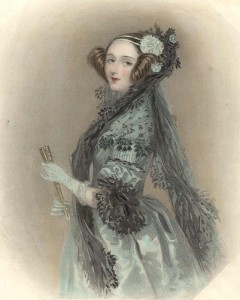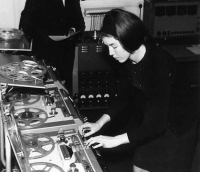On Delia Derbyshire for Ada Lovelace Day
Today, March 24 2010, is Ada Lovelace Day, the day when we celebrate women in science and technology and their achievements – typically by blogging about them. You can find out more about Ada Lovelace Day at the Finding Ada web site, but here’s the basic gist:
Ada Lovelace Day was first celebrated in 2009, when over 2,000 people blogged about women in technology and science and the event receive wide media coverage. This year the hope is to get 3,072 people to do the same. Ada Lovelace Day is organised by Suw Charman-Anderson, who writes:
“Augusta Ada King, Countess of Lovelace was born on 10th December 1815, the only child of Lord Byron and his wife, Annabella. Born Augusta Ada Byron, but now known simply as Ada Lovelace, she wrote the world’s first computer programmes for the Analytical Engine, a general-purpose machine that Charles Babbage had invented.”
And there’s plenty more where that came from.
The marvellous logo shown above was created by Sydney Padua and Lorin O’Brien and appears on the former’s wonderful 2D Goggles comic web site.
Delia Derbyshire
I’ve been interested in electronic music for decades, and I suppose one of my greatest influences was the BBC Radiophonic Workshop, sadly disbanded in March 1998 during the era of the BBC “internal market” under Director-General John Birt, when departments had to operate at a profit or close. This resulted in absurdities like it becoming cheaper to nip down the street from Broadcasting House to HMV in Oxford Street to buy a CD containing a piece of music to use in a programme rather than obtaining the track via the BBC Record Library.
Delia Derbyshire (1937–2001) was born in Coventry, my home town, and completed a degree in mathematics and music at Girton College Cambridge. In 1959, she famously applied to Decca to work at their recording studios in Broadhurst Gardens, West Hampstead and was turned down, being told that they didn’t employ women.
After a stint with the UN in Geneva and with music publisher Boosey and Hawkes she joined the BBC Radiophonic Workshop in 1962, which, in those days before synthesisers and samplers, was mainly experimenting with musique concrète techniques, involving recording sounds from ordinary objects like rulers and lampshades and playing them back at different speeds backwards and forwards, editing them together into pieces of music. Below you can see Delia describing her work in this respect.
Most electronic music of the time was fairly abstract, but as the job of the Workshop was to provide incidental and theme music for BBC television and radio productions, their output tended to be a lot more melodic and accessible. Derbyshire is probably best known today for her realisation – which amounted to co-composition – of Ron Grainer’s theme for the Dr Who television series which launched in 1963. However one could argue that some of her other work was more significant in artistic terms, such as her music for Barry Bermange’s work on the BBC Third Programme. Overall she provided themes and incidental music for over 200 radio and television programmes in the eleven years she worked at the BBC.
She also worked on other projects outside the Workshop, including co-founding the Kaleidophon studio with David Vorhaus and fellow Workshop member Brian Hodgson. The best-known work by this group (known as White Noise) – their first – was the seminal popular electronic music album An Electric Storm (1968) released on Island Records. The trio also recorded material for the Standard Music production music library, Delia composing under the pen-name “Li De la Russe”.
Having been away from the music scene for many years, her interest was rekindled in the late 1990s and she was working on a new album when she passed away as a result of renal failure while recovering from breast cancer.
You can read a fuller account of Delia Derbyshire’s life and work in this Wikipedia article.
![]() Recently Mark Ayres, BBC Radiophonic Workshop Archivist, has been going through the collection of her material held at Manchester University. BBC Radio 4’s Archive On 4 series is presenting a programme on this work, Sculptress of Sound: The Lost Works of Delia Derbyshire, which goes out on Saturday 27 March 2010 at 20:00 GMT.
Recently Mark Ayres, BBC Radiophonic Workshop Archivist, has been going through the collection of her material held at Manchester University. BBC Radio 4’s Archive On 4 series is presenting a programme on this work, Sculptress of Sound: The Lost Works of Delia Derbyshire, which goes out on Saturday 27 March 2010 at 20:00 GMT.



